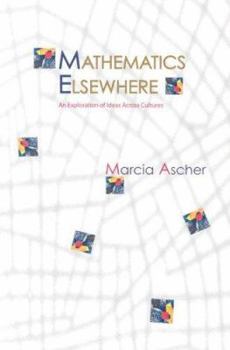Mathematics Elsewhere: An Exploration of Ideas Across Cultures
Select Format
Select Condition 
Book Overview
Mathematics Elsewhere is a fascinating and important contribution to a global view of mathematics. Presenting mathematical ideas of peoples from a variety of small-scale and traditional cultures, it humanizes our view of mathematics and expands our conception of what is mathematical.
Through engaging examples of how particular societies structure time, reach decisions about the future, make models and maps, systematize relationships, and create intriguing figures, Marcia Ascher demonstrates that traditional cultures have mathematical ideas that are far more substantial and sophisticated than is generally acknowledged. Malagasy divination rituals, for example, rely on complex algebraic algorithms. And some cultures use calendars far more abstract and elegant than our own. Ascher also shows that certain concepts assumed to be universal--that time is a single progression, for instance, or that equality is a static relationship--are not. The Basque notion of equivalence, for example, is a dynamic and temporal one not adequately captured by the familiar equal sign. Other ideas taken to be the exclusive province of professionally trained Western mathematicians are, in fact, shared by people in many societies. The ideas discussed come from geographically varied cultures, including the Borana and Malagasy of Africa, the Tongans and Marshall Islanders of Oceania, the Tamil of South India, the Basques of Western Europe, and the Balinese and Kodi of Indonesia. This book belongs on the shelves of mathematicians, math students, and math educators, and in the hands of anyone interested in traditional societies or how people think. Illustrating how mathematical ideas play a vital role in diverse human endeavors from navigation to social interaction to religion, it offers--through the vehicle of mathematics--unique cultural encounters to any reader.Format:Paperback
Language:English
ISBN:0691120226
ISBN13:9780691120225
Release Date:November 2004
Publisher:Princeton University Press
Length:224 Pages
Weight:0.80 lbs.
Dimensions:0.5" x 6.2" x 9.2"
Customer Reviews
3 ratings
Mathematics is everywhere if you know how to look, Ascher does
Published by Thriftbooks.com User , 17 years ago
Mathematics is found in many places and in many forms, you only have to look for it in the right way. Ascher does that in this book. In chapter 1, "The Logic of Divination" randomization processes used in Madagascar, the Caroline Islands of the Pacific and the west coast of Africa are described. The processes are described using Boolean algebra and modular arithmetic. Accurate calendars are an important component of most cultures and the computations used to maintain calendars in many cultures are described in chapters 2 and 3. The cyclic nature of the passage of the days is described using modular arithmetic. Some of the cultures whose calendars are explained are the Jewish; a tribe living on the island of Sumba in Indonesia called the Kodi, the Mayans of Central America and the Trobriand Islanders of the coast of New Guinea. Chapter four deals with the tactics used by the Polynesian people as they navigated thousands of miles across the sea from one Pacific island to another. Their use of stick charts describing the paths based on wave patterns is an interesting form of graph. Relationships are the topic of chapter five, in particular the cyclic, sequential and circular structure used by the Basque people. Each person has a nearest neighbor on the "left" and on the "right" and they interact most strongly with those people when it comes to giving and receiving aid during critical times such as the harvest. Other relationship structures covered are the complex relationships in the Tonga island chain and among the Borana people of Ethiopia. The sixth and final chapter describes figures that Tamil people in India draw on their doorsteps using white powders. The designs are so complex that they are fractal in nature and computer scientists have used them as models to develop descriptive picture languages. Ascher describes many uses of mathematics, from the Pacific Islands of Polynesia to the tribal cultures of Africa and many places in between. This is a fascinating book and one that teachers of comparative cultures should examine. The mathematics is not difficult; it is well within the level of understanding of anyone with knowledge of basic algebra. I found it so interesting that I am now considering talking to the sociology department about the possibility of team teaching an honors level course on the use of mathematics in so-called "primitive" cultures.
refreshing!
Published by Thriftbooks.com User , 22 years ago
there are very few books on ethnomathematicsout there (another good one is MathematicsAcross Cultures, Selin (ed.))This book has the plus of smooth and enjoyablereading, WITHOUT wattering down in contentAdvisable for teachers, historians, and, in addition, persons interested in the epistemologicalproblems in science.Plese keep on writing, Marcia!
Excellent!
Published by Thriftbooks.com User , 23 years ago
This is an excellent book. It sounds like an odd premise for a book - look at ideas in 'other' cultures and see how these are in essence mathematical ideas (in the western sense). However, what the author has done has turn what could be 'worthy but dull' material into a fascinating read. If you teach math (school, college or university) you will find lots of great topics to illustrate your lectures. If you just like math then this is a good read. The author has a nice style too - very easy to read. I loved this book. If you have any interest in math ideas then you will too.





